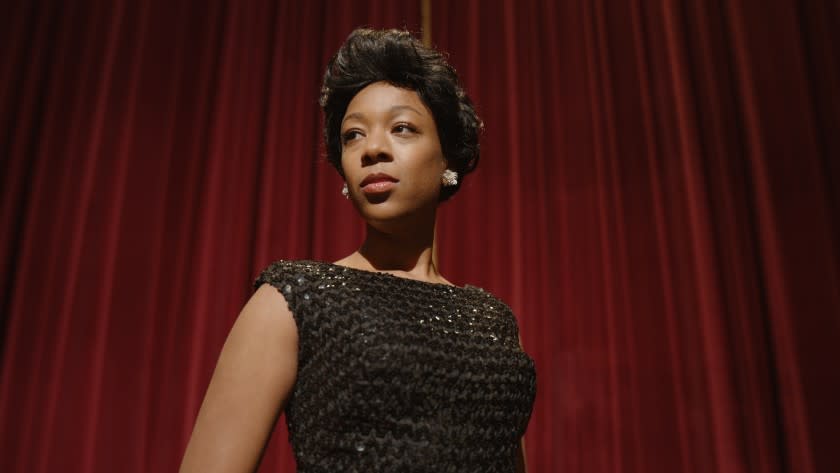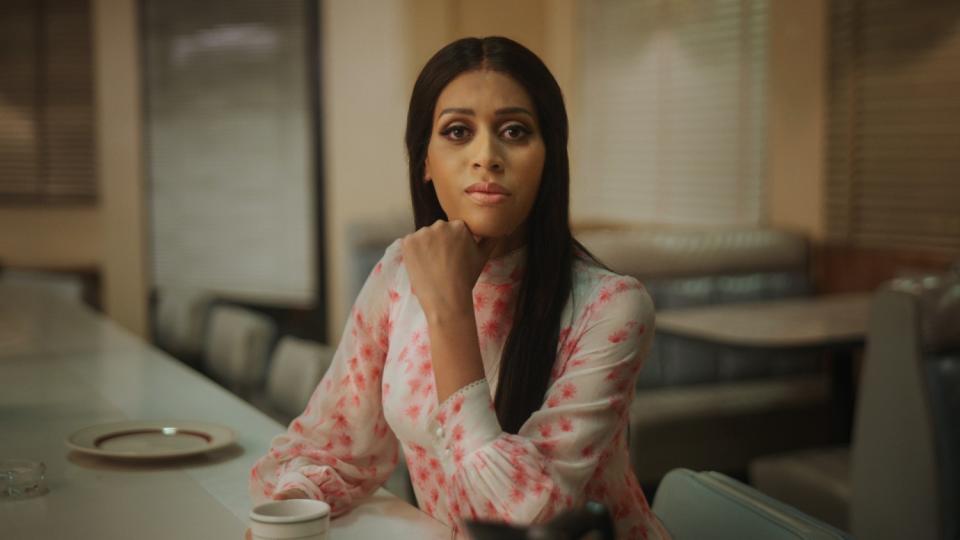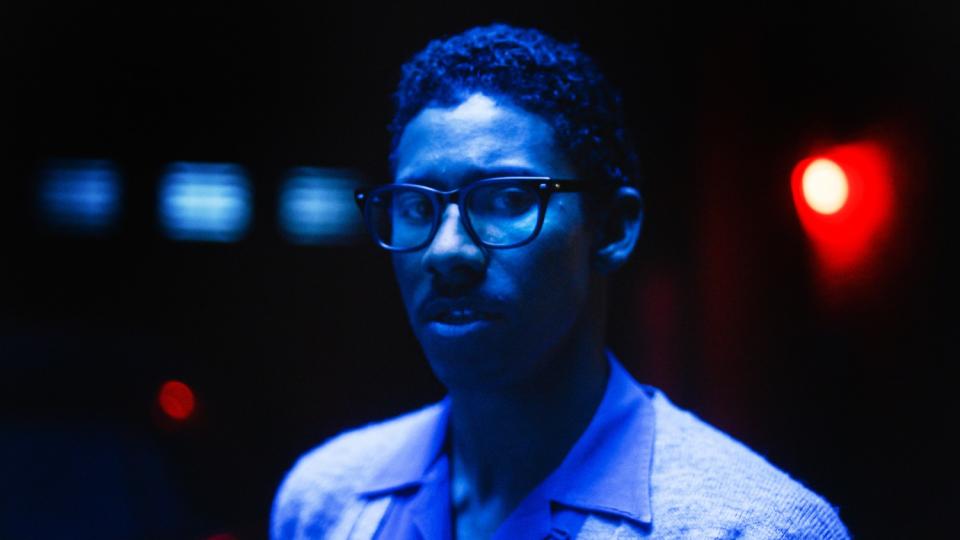There would be no Stonewall without Black queer activists. A new docuseries shows why

It’s 1959 in New York City. A 28-year-old Lorraine Hansberry descends the steps of a theater in a black dress with jeweled earrings — a stark contrast from her typical chinos or corduroys, button-down shirts, cardigans, white sneakers and socks.
Her play “A Raisin in the Sun” is about to premiere. It will make her the first Black female playwright and first Black director on Broadway.
“Never before in the entire history of the American theater,” writer James Baldwin would say, “had so much of the truth of Black people's lives been seen on the stage.”
Hansberry, played by Samira Wiley (“The Handmaid’s Tale”) appears in Episode 3 of the four-part docuseries “Equal,” premiering Thursday on HBO Max.
“In a lot of ways, what we've done is a primer: a very slick, beautiful, edgy, hip primer for all this history,” showrunner Stephen Kijak told The Times, “that we hope kicks open the door for people to discover more and to be inspired to do their own activism.”
“Equal,” narrated by "Pose" Emmy winner Billy Porter, tells the tale of activists, leaders and unsung heroes within the LGBTQ movement through the Stonewall riots in 1969, including two early gay rights groups of the 1950s, the Mattachine Society in Los Angeles and the Daughters of Bilitis in San Francisco, and San Francisco’s Compton's Cafeteria riot in 1966.
And though the third episode specifically examines Black contributions to the LGBTQ civil rights movement, the seismic impact that Black, queer Americans had on politics, from the LGBTQ movement to the civil rights movement, is present throughout.
“A whole show could be done on Ernestine Eckstein, who was just a brushstroke in Episode 1, but it was important to highlight that those early homophile movements were very white,” Kijak said. “But here's this woman, Ernestine Eckstein, probably one of the only Black women in the Daughters of Bilitis at the time, who herself was a real radical and pushed a little further and harder than most of them did at the time.”
Eckstein was a leader in the New York chapter of the group, the first lesbian civil and political rights organization in the U.S. The Daughters are perhaps best known for their white founders, Del Martin and Phyllis Lyon, who eventually married in San Francisco's first same-sex wedding.

“I think we cannot be as radical as homosexuals as we can, as we could and as we do as Negroes,” Eckstein says in an archival clip in the episode. “Because the Negro cause is already widely accepted. The homosexual cause is not yet accepted. And I think this has to come first: the acceptance. Then you can push as far and as often and as hard as you’d like.”
Many of the Black characters in “Equal” do push, like Eckstein and civil rights leader Bayard Rustin (Keiynan Lonsdale). For some, their very existence in a world that criminalizes them is a political statement in its own right.
For example, trans woman Lucy Hicks Anderson (Alexandra Grey), born in Kentucky in the 19th century, was a socialite and chef in Oxnard, Calif., in the 1920s, ’30s and ’40s.
“One of Lucy's lines in Episode 2 is: 'In 1944, my secret could get you killed.' That's true today,” said Kimberly Reed, the episode's director and an out and proud trans woman. “Especially with trans women, especially with Black trans women. I mean, this is still a raging problem. So it unfortunately didn't require a lot of adjustment to tune things up for today.”
The episode's storyline follows three trans individuals — Anderson, the little-known bootlegger Jack Starr (Theo Germaine) and the world’s first transgender celebrity, Christine Jorgensen (Jamie Clayton.)

Anderson in particular is a prominent figure in her community, serving coffee to cops at her restaurant in the morning before being jailed by those same officers for failing to conform to societal expectations of gender identity.
The same episode also features a composite character, Alexis (Isis King) — “the spirit of the Compton’s Cafeteria riot” — to represent the queer women of color who rose up against pervasive police harassment. Three years later, Black drag queen Marsha P. Johnson helped lead the Stonewall uprising in New York's Greenwich Village that is often credited as the birth of the modern gay liberation movement.
"On the evening of Stonewall, they weren't standing there holding up signs and thinking about Compton's,” Reed said, but “it was definitely in the zeitgeist. And without hearing about that, without being buoyed by the activism of these other people, who knows what would have happened at Stonewall?”
“We make a point in [Episode 2] that you needed those years of counterculture across all the different social movements,” Kijak said. “The queer movement really did benefit from that growing unease and all those hot spots of riot and rebellion pushing things forward.”

Indeed, each episode more or less ends in a riot or protest, which dovetails with the ongoing contemporary civil rights movement. The police killing of George Floyd in Minneapolis in May happened after filming began, but the show’s creators didn’t have to change much.
“We already were leaning into that more militant tone, and the sense of the show as a rallying cry already,” Kijak said. “And maybe getting a little hesitancy from higher-up decision makers who might have been a little nervous about pushing it that far. But as we were going, it's just like, 'Look around you. How can we not?' You had to confront the moment.”
Wiley, who plays Hansberry, filmed her part before Floyd’s death. But it forced her to reflect on being Black and queer in a world that still doesn’t always accept that.
“There was something about George Floyd this year, and having that guy [officer Derek Chauvin] be on his neck for almost nine minutes that really, really, really hit me in a way that I have not been hit before,” Wiley told The Times. “And it made me really have to look in the face at my reality every day.”

Hansberry also was a Black, queer woman — although it wasn’t until later in her life that she began to explore her lesbianism. Wiley sees herself in Hansberry and in the semi-autobiographical “Raisin in the Sun” character Beneatha. She watched plenty of clips of Hansberry in preparation for the role.
“There is something so … soft about the way she speaks, but there's never anything soft about the words that she's saying,” Wiley said. “It's almost like she doesn't have to yell it, because her words are yelling at you.”
Wiley first read “A Raisin in the Sun” in high school, then again at the Juilliard School in New York City. She and the playwright both spent part of their 20s in New York. Hansberry at 21 moved to Harlem, where she became an activist.
“Sharing the fullness of who we are with the world, what are the benefits of that? What are the drawbacks of that?” Wiley wants to ask. “Why is that scary? Why is that empowering? Going into all of those places, I think could be really fun with Lorraine. Lorraine, where you at?”

The actress was also drawn to the story of Rustin, portrayed by Australian actor Lonsdale in Episode 3. Rustin worked with A. Philip Randolph to help organize the 1963 March on Washington.
“Keiynan Lonsdale … who is not American, who himself is in this very recent phase of exploring, discovering and reckoning with his own sexuality, he was just blown away by Bayard Rustin's story,” Kijak said. “As a young person who comes from another country, [he] had never heard of him. And to realize, like, 'Oh, my God, a Black, out, gay man was the driving force behind the March on Washington,' it was mind blowing to him, to see that and to put himself in that context.”
Rustin and Hansberry were contemporaries and friends. They, along with other Black, queer leaders in activism and the arts, built the scaffolding that subsequent generations have continued to climb. The voice of Porter — who himself has taken a recent stand for the Black LGBTQ community — lends itself well to the show.
“We're just glad we could broadcast and amplify the stories in such a way that hopefully people can then do more learning,” Kijak said. “With Billy's fire heating it all up, then get riled up and go out there and do something about it.”
This story originally appeared in Los Angeles Times.

